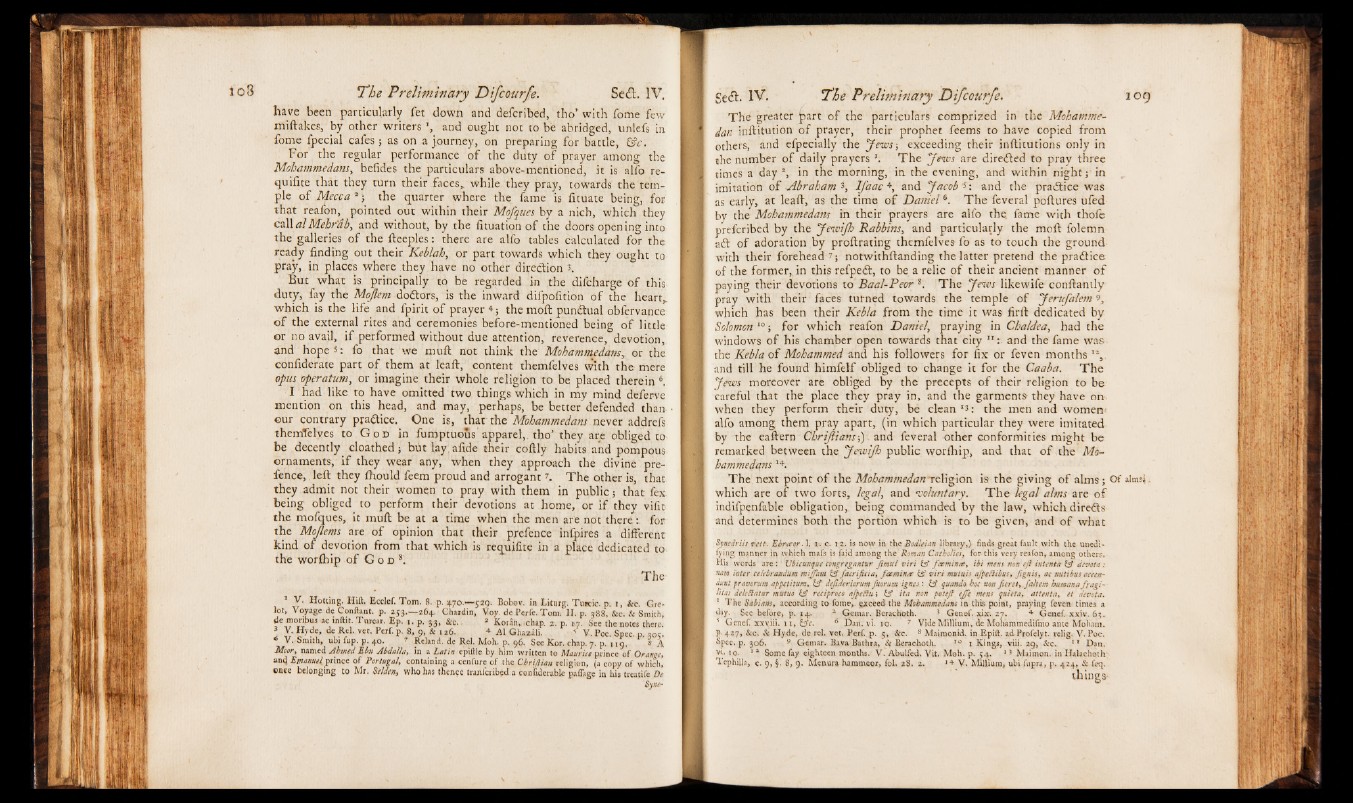
have been particularly fet down and defcribed, tho’ with fome few
miftakes, by other writers *, and ought not to be abridged, unlefs in
fome fpecial cafes; as on a journey, on preparing for battle, &c.
For the regular performance of the duty of prayer among the
Mohammedans, befides the particulars above-mentioned, it is alfo re-
quifite that they turn their faces,, while they pray, towards the temple
of Mecca *; the quarter where the fame is fituate being, for
that reafon, pointed out within their Mofques by a nich, which they
callalMehr'db, and without, by the fituation o f the doors opening into
the galleries of the fteeples: there are alfo tables calculated for the
ready finding out their Keblah, or part towards which they ought to
pray, in places where they have no other direction 3.
But what is principally to be regarded in the difcharge of this
duty, fay the MoJlern dodtors, is the inward difpofition of the heart,,
which is the life and fpirit of prayer + ; the molt punctual obfervance
of the external rites and ceremonies before-mentioned being of little
or no avail, if performed without due attention, reverence, devotion,
and hope 5: fo that we muft not think the Mohammedans, or the
confiderate part of them at leaft, content themfelves with the mere
opus operatum, or imagine their whole religion to be placed therein 6.
I had like to have omitted two things which in my mind deferve
mention on this head, and may, perhaps, be better defended than
©ur contrary practice. One is, that the Mohammedans never addrefs
themfelves to G od in fumptuoSs apparel,, tho’ they are obliged to
be decently cloathedj butlay.afide their coftly habits and pompous
ornaments, if they wear any, when they approach the divine prefence,
. left they fhould feem proud and arrogant T. The other is, that
they admit not their women to pray with them in publics that fex.
being obliged to perform their devotions at home, or if they vifit
the mofques, it muft be at a time when the men are not there: for
the Mojlems are of opinion that their prefence infpires a different
kind of devotion from that which is requifite in a place dedicated to
the worfhip o f G o d 8.
The
The greater part of the particulars comprized in the Mohammedan
inftitution of prayer, their prophet feems to have copied from
others, and efpecially the Jews-, exceeding their inftitutions only in
the number of daily prayers The Jews are directed to pray three
times a day *, in the morning, in the evening, and within night; in
imitation of Abraham 3, IJ'aac *, and Jacob *: and the practice was
as early, at leaft, as the time of Daniels. The feveral poftures ufed
by the Mohammedans in their prayers are alfo the fame with thofe
prefcribed by the JewiJh Rabbins, and particularly the moft folemn
adt of adoration by proftrating themfelves fo as to touch the ground
with their forehead '>•, notwithftanding the latter pretend the pradtice
of the former, in this refpedt, to be a relic of their ancient manner of
paying their devotions to Baal-Peor %. The Jeivs likewife conftantly
pray with their faces turned towards the temple of Jerufalem a,
which has been their Keb/a from the time it was firft dedicated by
Solomon 10; for which reafon Daniel, praying in Chaldea, had the
windows of his chamber open towards that city 11: and the fame was
the Kebla of Mohammed and his followers for fix or feven months **,,
and till he found himfelf obliged to change it for the Caaba. The
Jews moreover are obliged by the precepts of their religion to be
careful that the place they pray in, and the garments they have on
when they perform their duty, be clean 13: the men and women'
alfo among them pray apart, (in which particular they were imitated
By the eaftern Chrijlians-,) and feveral other conformities might be
remarked between the JewiJh public worfhip, and that o f the Mohammedans
,+.
The next point of the Mohammedan 'religion is the giving of alms; Of aims;
which are of two forts, legal, and voluntary. The legal alms are of
indifpenfable obligation, being commanded by the law, which diredts
and determines both the portion which is to be given* and of what
Syncdriis vett. Ebraor. 1. i. c. 12, is now in the Bodleian library,) finds great fault with the unedifying
manner in which mafs is laid among tht Roman Catholics, for this very reafon, among others.
His words are : Ubicmique. congregantur Jimul viri & fxmince, ibi mens non eji intenta demta:
nam inter celebrandum tnijfam & facrifitia, famine? £*r viri mutuis afpeSibus, Jignis, ac runibus aceen-
dutit pravorum appetitum, £2? defiderkruin fuorum ignes: £3* quando hoc non fierce,, fatten human a fragi-
litas dele ft at ur mutuo & reciproco afpeftui & it a non poteft effe mens quieta, attenta, et deveta.
1 The Sabiam, according to fome, «ytceed the Mohammedans in this point, praying feven times a
day. Sec before, p. 14. 2 Gemar. Bcrachoth. 3 Genef. x i x i 27. 4 Genef. xxiv. 63.
^ Genef. xxviii. 11, 6 Dan. vi. 10. 7 Vide Millium, de Mo ham m edifmo ante Moham.
P- 427, &c. & Hyde, de rel. vet. Perl', p. 5, &c. s Maimonid. in Epilt. ad-Profelyt. rclig. V. Poc.
Spec. p. 306. 9 Gemar. Bava Bathra, & Berachoth. 10 1 Kings, viii. 29, &c. IT Dan.
jg; vi. 10. iS Some fay eighteen months. V. Abulfed. Vit. Moh. p. 54. 13 Maimon. in Halachotli;
I Tcphilla, c. 9, §. 8, 9. Menura hammeor, fob 28. 2. *+ V* Miliium, ubi fupra, p, 424, & feq.
things